Should you give up your salmon to save a species?
Logan Saltmarsh is worried. But it’s not schoolwork or bolshie big kids unsettling this 12-year-old; it’s Tanya Plibersek. In fact, the whole town of Strahan is on edge.
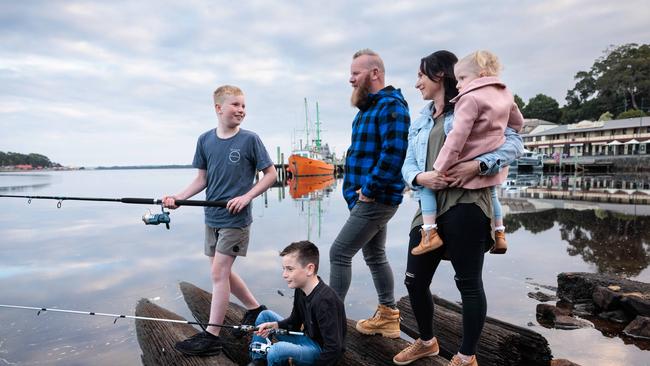
Logan Saltmarsh, normally an easygoing, knockabout ginger-haired 12-year-old, is worried. It’s not schoolwork or bolshie big kids unsettling the youngster; rather, it’s the thought of having to leave his beloved hometown.
Born as a mining port, Strahan is a small, isolated and picturesque community of about 700, perched on the edge of vast estuarine Macquarie Harbour on Tasmania’s wild, rugged West Coast. The number and fortunes of Strahan’s stoic inhabitants have waxed and waned with those of local industries – mining, logging and, more recently, tourism and aquaculture.
It is in this latter trade – the farming of Atlantic salmon and trout in circular pens in the harbour – that Logan’s dad, Adam, and about 118 others make their living. Salmon farming is at once one of Tasmania’s greatest success stories – a burgeoning, lucrative trade built from scratch – and one of its most divisive environmental flashpoints.
Any day now federal Environment Minister Tanya Plibersek will make a decision that could curtail or even end salmon farming in Macquarie Harbour.
It’s a response to concerns that waste and oxygen depletion linked to the fish farms are driving a globally unique and endangered fish, the Maugean skate, to extinction.
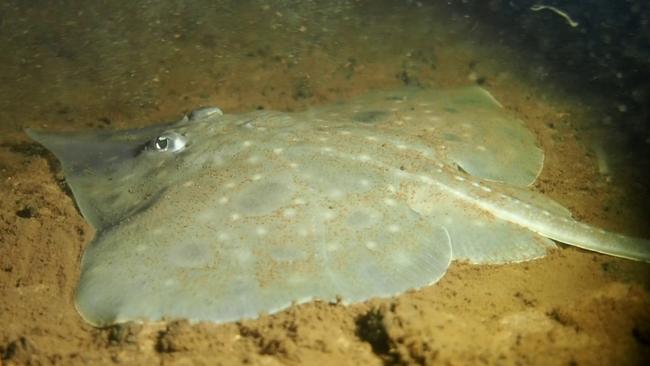
The prospect of a federally ordered industry shutdown, however, has Logan, his family, mates and much of the town deeply worried. So much so, the lad has written to Plibersek, urging her to consider their future as much as that of the skate.
“Imagine living in beautiful Strahan, your hometown, and then your parents’ jobs in the fish farm industry are lost and you have to move to a new, scary place you’ve never been to,” Logan has written to the minister.
“If you shut the industry down, you will be forcing many innocent families to flee the town to keep their families afloat.”
It’s a plea that underscores the devilishly difficult decision facing Plibersek.
Concern about the skate, a medium-sized, flat-bodied sting ray-like fish of ancient lineage found nowhere else on the planet, emerged in a significant way in May last year. Scientists at the University of Tasmania’s Institute for Marine and Antarctic Studies had been keeping an eye on the skate since 2012, when they first became concerned the population – a living link to an era ruled by dinosaurs – was under stress.
Based on data from netting surveys, IMAS experts found the population had crashed – a decline of almost 47 per cent – between 2014 and 2021. That means a total surviving population of fewer than 1600 individuals.
Most alarming, IMAS found very few juveniles were emerging to keep the species going, creating “significant concerns”. Generally cautious scientists pleaded publicly for “immediate action” to “directly address habitat degradation in the harbour”.
The IMAS report was coy about pointing fingers but noted “in the past 15 years altered river flows – growing reliance on hydro-electric generation and production demand – and large-scale development of salmonid aquaculture have resulted in considerable changes to the environment”.
Four months later, the scientific shockwaves reached Canberra. The federal government’s Threatened Species Scientific Committee issued updated advice for the skate, sharing IMAS’s alarm and pulling fewer punches about what it believed to be the key cause.
“Substantial recent evidence indicates a high risk of extinction for the species in the near future,” the committee warned. “The primary threat to the species is degraded water quality, in particular substantially reduced levels of dissolved oxygen throughout Macquarie Harbour.
“There is a significant correlation between the reduction in dissolved oxygen levels and increases in salmonid aquaculture, due to the bacterial degradation of organic material introduced into the water column from fish feed and fish waste.”
The committee called for “urgent actions … prior to summer 2023 to ensure the species does not go extinct”. These included improving oxygen levels in the harbour “via a reduction in salmonid aquaculture organic loads and/or … remediation technologies”. It recommended a captive breeding program while also pleading for more work on how hydro dams increased water flow into the harbour, preventing reinvigorating fresh sea water flowing inward from its narrow mouth.
Since the committee belled the cat, IMAS has made a promising start to the captive breeding program, while a trial scheme to pump oxygen into the water via a barge has begun. However, the “urgent action to reduce aquaculture organic loads” has yet to eventuate.
Instead, Plibersek has accepted a request from green groups to rethink a 2012 decision allowing expanded salmon farming in the harbour without the need for detailed environmental approvals.
She can uphold the 2012 decision as is, add tougher conditions or declare salmon farming in the harbour is a “controlled action” under federal environment law.
This last outcome is the one feared by industry, as it would require a new environmental assessment, potentially taking years, and leave the legality of the fish pens in serious doubt.
It’s this looming decision that hangs over Strahan, the industry and its workers, as well as the precariously placed Maugean skate.
Environment groups and some scientists say Plibersek must revoke the approval and get fish pens out of the harbour to give the skate any chance of clinging to existence.
“We know what needs to be done; the federal Environment Minister knows what needs to be done,” says the Australia Institute’s Tasmanian director, Eloise Carr. “The science is clear and unequivocal: salmon farming in Macquarie Harbour is having clearly unacceptable impacts on matters of national environmental significance and has to end.”
The Bob Brown Foundation – which, like the Australia Institute, sought the review by Plibersek – agrees.
“I’m hoping Tanya Plibersek will stand by her promise to the Australian public of no new extinctions on her watch,” BBF marine campaigner Alistair Allan says.
“If the Maugean skate goes extinct it will be the first extinction of a shark or ray in the world. That’s not something we can have on Australia’s environmental record. We now have clear evidence that salmon farming has impacted the skate and therefore the initial decision to allow salmon farming in the harbour needs to be revoked.”
A 2020 study suggested removing fish farms would reduce hypoxic (oxygen-depleted) water in the harbour by 50 per cent.
Industry, however, plays down its impact and argues there is no scientific evidence to support claims removal of salmon farms would save the skate.
Salmon Tasmania points out that production in the harbour – after peaking at a biomass of 20,735 tonnes in 2015 – is now 9000 tonnes, lower than in 2012 when the federal green light was given. Its submission to Plibersek concedes salmon pens have “had an influence on levels of dissolved oxygen in the harbour” but argues this was known at the time of the 2012 decision.
It has submitted its own scientific modelling, by environmental engineer Ian Wallis, suggesting it shows salmon farms’ drawdown of oxygen has “minimal impact” on skate habitat.
“Salmon farms reduce the dissolved oxygen in the top layer by 4 per cent,” the submission says. “This minor decrease would have negligible effect on the survival of the skates in their normal habitat.”
At lower levels, the Wallis modelling suggests the “extra load” from salmon farms reduces average dissolved oxygen from 35 per cent to 25 per cent.
Macquarie Harbour provides about 13 per cent of the total salmon produced in Tasmania by the three companies – Tassal, Huon Aquaculture and Petuna.
However, it makes up about half of all production for Petuna. The company’s general manager (technology and strategy), Depha Miedecke, says blaming salmon for the skate’s woes is overly simplistic and unhelpful to the species.
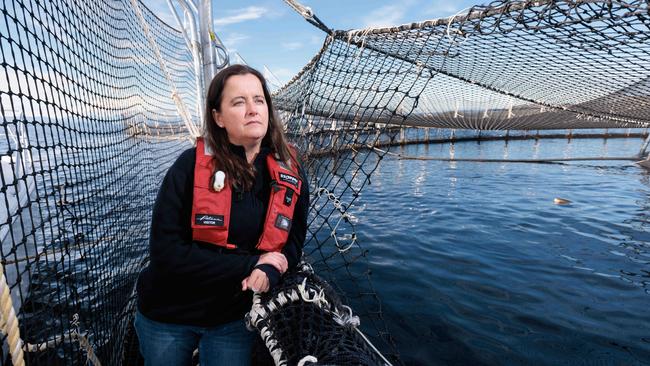
“Macquarie Harbour is a huge water body – nearly seven times the size of Sydney Harbour – and our industry, the three companies that operate here, take up a bit under 3 per cent of the geographic area,” Miedecke says.
An order from Plibersek to reduce or suspend production in the harbour would be a “significant” blow to the $1.46bn industry but an even bigger deal for Petuna.
“It would be catastrophic – it’s 50 per cent of our production,” Miedecke says. “We’ve been operating here as an industry for nearly 40 years and we want to be here well into the future.”
Miedecke says industry contests the Threatened Species Scientific Committee’s assessment of its “catastrophic” impact on the skate.
Instead, it believes the species’ plight is the result of a complex series of factors including hydro-electricity inflows, historic mining pollution, gillnet fishing, predators and siltation of the harbour mouth.
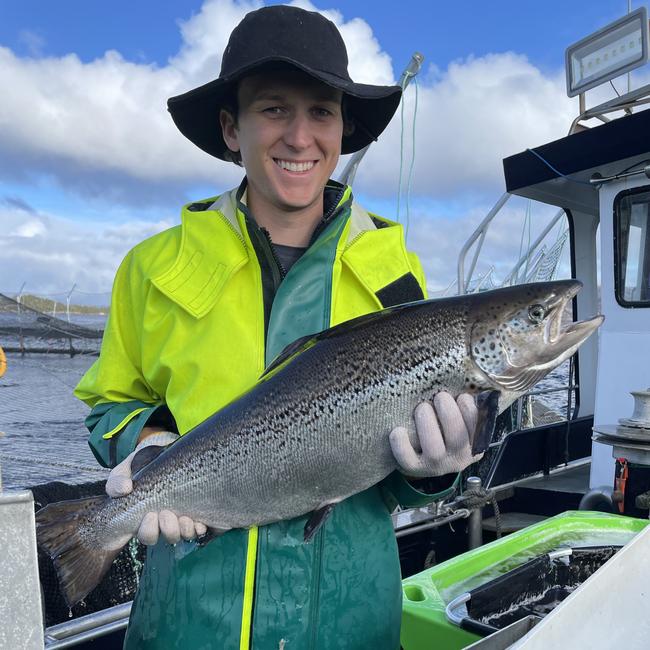
“It’s a really complex water system, Macquarie Harbour, and what we do in terms of the nutrients and the impact on oxygen levels is a small percentage of the overall oxygen drawdown,” Miedecke says.
“Yes, our industry is part of that, but we have taken action to mitigate that. Our biomass levels have reduced.
“We’ve had our environment licences renewed for a further two years, which shows the (state) Environment Protection Authority has confidence in our operations in the harbour. And we’re looking at what other avenues we can take to improve oxygen levels.”
The industry received some good news last month, with the EPA issuing encouraging new oxygen level data from monitoring. “Oxygen levels have gradually increased, and some deeper parts of the harbour are approaching the … data from before oxygen levels started to decline circa 2009,” EPA director Wes Ford says.
Along with a “great improvement” seen from video surveys of the harbour floor under the fish farms, Ford is “cautiously optimistic that environmental conditions in Macquarie Harbour are improving”.
Salmon Tasmania is crowing. “What this shows is that the environmental health of the harbour and salmon aquaculture are not mutually exclusive,” Salmon Tasmania chief executive Luke Martin says.
“This confirms that the science and regulation that the industry is based on are working – we can have both a healthy harbour and salmon aquaculture.”
Others argue the improvement is purely the result of a one-off influx of oxygen-rich oceanic water through the harbour heads last year, rather than the oxygenation pumping trial or industry improvements.
“It’s a bit like saying we get one cold year and climate change is over,” says Stewart Frusher, a retired professor of marine science at the University of Tasmania. “The main trend is unfortunately what we’ve seen in the Maugean skate: clearly downwards.”
Frusher, who has worked with the salmon industry and supports its role as a global food source, says although other factors are affecting the skate, the evidence suggests fish farming is a key cause of its decline.
“Its decline is strongly correlated with the aquaculture industry, so while the skate may have been able to endure all those other impacts, it certainly hasn’t been able to endure the salmon farming,” Frusher says.
“The demise of the skate is an early warning signal that the ecosystem itself is beginning to unravel.”
Frusher says recent reductions in stocking levels were too little, too late, with the damage from past overstocking still taking a toll.
“You’ve given the system such a huge shock that even going back to the 2012 stocking levels doesn’t mean that suddenly it’s all right,” he says.
“You’ve created a situation that unfortunately can only be rectified by getting rid of that industry out of that harbour.”
That is a prospect horrifying to many in and around Strahan.
Logan’s dad, Adam Saltmarsh, widely known as “Salty”, moved to the town 20 years ago after falling in love with a local woman, now his wife, Samantha, a photographer. Salty has worked his way from farmhand to maintenance manager at Tassal, and the couple has built a life in Strahan and is raising three children.
Closure or major curtailment of aquaculture in the harbour would be devastating for the family. “We’d have to uproot, pack up and move away,” Salty says.
“Either that or I’d have to leave the family here and go and chase work on the mainland.
“It would destroy Strahan fully. I’m just one of many who have kids in the local school, use the local shops or who have partners working locally. We’d all have to pack up and go.” Like their son, Salty and Samantha do not want to leave.
“It’s a good place to raise kids – safe, everyone knows everybody and looks out for each other,” Salty says. “It’s a good little school and the kids have got the harbour and the beach.”
He says the campaign against salmon farming – which also highlights its impact on seals and seabirds, and its use of krill and antibiotics – takes its toll.
“It hurts because we all take pride in our jobs and our workplaces,” he says. “I wouldn’t be doing it if I thought what other people think about what we’re doing to the waterways.”
Strahan Primary School Association chairwoman Annie McKay fears the school will close if the salmon pens are forced out of the harbour.

“To lose the aquaculture industry would be catastrophic for the school – we have nearly 60 students and over half of those have a parent employed in the industry,” McKay says.
“Loss of those 16 families would see such a reduction in numbers that the school would be unviable.
“That would mean children as young as four and five having to bus it … (up to) an hour, just to receive a basic education.”
Industry says 65 Strahan locals are directly employed in salmon farming – almost a third of employed townsfolk – with another 54 coming from elsewhere on the West Coast and farther afield.
Inquirer could find few locals willing to back the reduction or removal of salmon farming from the harbour. Of those holding that view, none was willing to be named for fear of being ostracised.
One local tourism worker describes salmon pens as having a “catastrophic environmental impact on the harbour”, urging Plibersek to revoke federal approvals.
However, in echoes of the dark days of the forest wars, she would not be named for fear of repercussions, both socially and for her employer.
West Coast mayor Shane Pitt says despite some local concern when fish stocking levels were at their peak, the community is now “right behind the industry”.
“With the reduction in the biomass, it’s reached a sustainable level,” Pitt says. “It will decimate Strahan if they remove the salmon farms.”
He warns a host of local businesses – from cafes to electrical, mechanical and welding contractors – would lose vital trade linked to the fish farms.
And like many, Pitt fears Plibersek’s decision – whatever it is – will be subject to lengthy legal challenges, plunging the region into years of uncertainty.
He says similar uncertainty during battles over the timber industry took a sometimes tragic toll on regional communities.
“People took their own lives – we don’t want to see that happen in Strahan now,” he says.
The mayor is urging government to consider dredging the harbour mouth to let in more sea water, before countenancing fish farm closures.
Salmon, like forestry before it, has become intensely political. State Labor’s new pro-industry opposition leader Dean Winter has told Plibersek bluntly that she has no justification for reducing pens in Macquarie Harbour. The Liberal state government is equally steadfast in backing the industry, blaming “green nay-sayers” for pressuring Plibersek into an unnecessary review.
“That the federal Labor government has caved to green pressure, underpinned by skewed science, to reconsider the 2012 decision … should also surprise no one,” state Business, Industry and Resources Minister Eric Abetz says. “These requests have no sound basis, and no change to the original decision is required.”
Abetz says the industry is well regulated and “has grown to be a key pillar of the economy, supporting thousands of jobs across regional Tasmania”.
The issue is attracting global interest, with UNESCO seeking a “please explain” from the federal government, given that a third of the harbour’s waters – although none of the fish pens – lie within the Tasmanian Wilderness World Heritage Area.
“The extinction of the skate would be a global extinction event and Tasmania’s reputation for clean and green produce will be tarnished forever,” says Leonardo Guida, a shark scientist at the Australian Marine Conservation Society.
“The skate’s imminent extinction risk is emblematic of Australia’s failing nature laws, and saving the skate is the litmus test of how the Australian government addresses our biodiversity crisis.
“This could be the first time aquaculture has been the primary cause and directly driven the extinction of a marine fish.”
Plibersek is wading through 2500 submissions and carefully considering her responsibilities under the federal Environment Protection and Biodiversity Conservation Act.
She knows that whatever decision she makes will trigger a legal and political bunfight.
However, she has already warned the state she believes the skate faces a “very high risk of extinction” and that fish farms and hydro operations are to blame.
Most worrying for industry, she has told the state that evidence points to the need for “lower salmon farming industry loads”.
“The government is carefully considering the information and the scientific advice that it has obtained to ensure a proper, legally robust decision,” she says.
Logan’s parting advice to the minister encapsulates the hopes of many: “There is a way for the skate and the fish farms to coexist in harmony.”
For now, though, that way remains unclear.




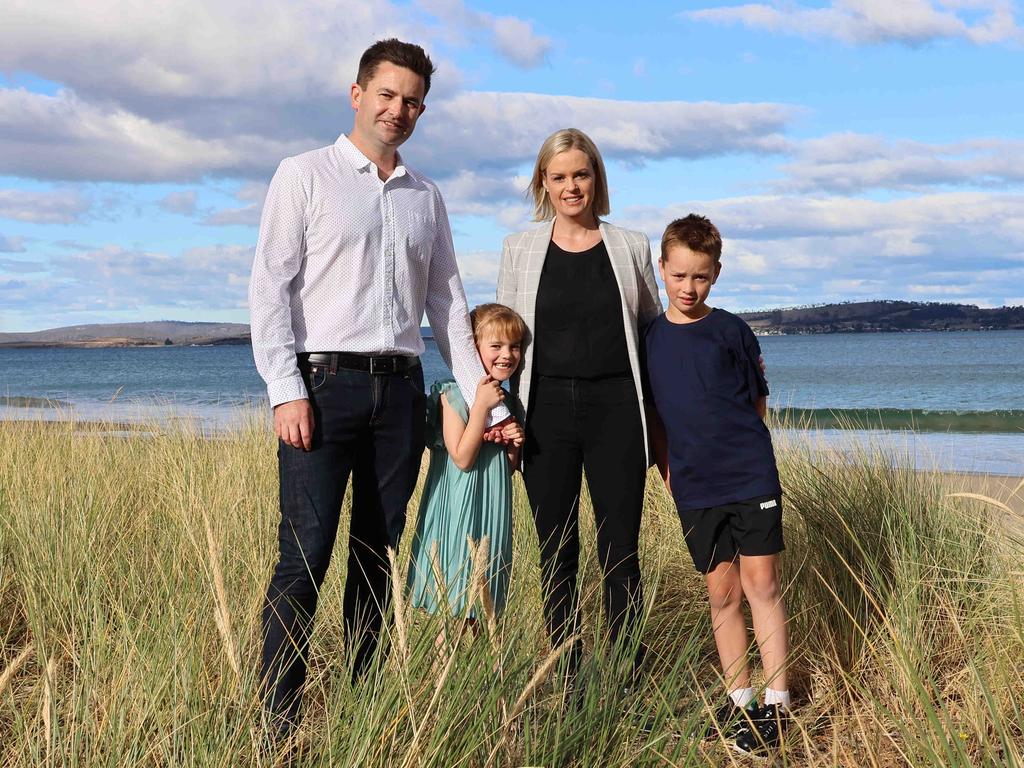

To join the conversation, please log in. Don't have an account? Register
Join the conversation, you are commenting as Logout